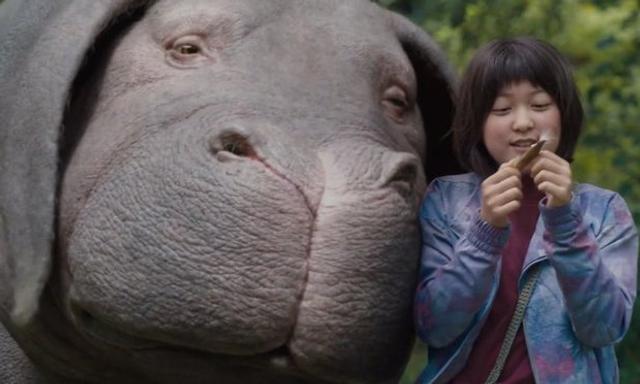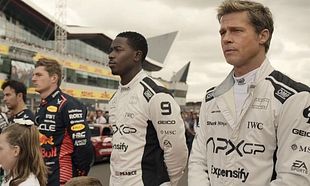Okja opens on Lucy, the CEO of Mirando Corporation, announcing the new ‘superpig’ competition her company is running. The world has become overpopulated and is running out of food and these large, hippo-like creatures, which require less feed and produce less excretion than other animals, will provide the perfect food source. A number of them are sent around the world to be grown over a period of ten years.
One of these animals is Okja, who is raised with a young girl named Mija (An Seo Hyun) in a quiet, far off South Korean forest. When Okja is determined the winner of the Mirando competition, she is taken away, and Mija fearlessly runs away from home to save her friend.
Anyone who has read my reviews of Netflix original movies released over the last 12 months, including the likes of War Machine, Sand Castle, Barry, Mascots and Skiptrace, have undoubtedly noticed my increasing sense of disenchantment with Netflix’s output in this arena. These films verge from mediocre to terrible, and while Netflix have produced some incredible television and documentary content, its movie dramas and comedies just aren’t up to scratch.
Fortunately, Okja seems to have broken that cycle, and while the film isn’t without its flaws, it’s certainly a powerful movie that will find a firm fan base.

It’s worth establishing firstly the reception at Cannes that Okja is after coming off – the film was booed at Cannes as a result of its Netflix logo (attendees were unhappy with the streaming service having any kind of presence in the festival) in the opening credits, but went on to receive a standing ovation. There is nothing that feels ‘Netflix’ about the film in any shape of form, which works to its advantage. Its subject matter and content is purely the result of the creative vision and determined message of director-co-writer Bong Joon Ho (previously behind Chris Evans-starrer Snowpiercer).
The innocence, determination and courage of Mija are beautifully portrayed by Seo-Hyun Ahn. She is pitted against Jake Gyllenhaal and Tilda Swinton’s similarly (arguably too similarly) characterised commercialist, sensationalist and greed-driven TV personality Dr Johnny Wilcox and Lucy. Other actors that come into play include Paul Dano, Lily Collins and The Walking Dead’s Steven Yeun, but it’s more fun to watch how their characters emerge in the story than it’s worth divulging here.
Indeed the story unwraps beautifully over its 2 hour running length and while on the outside it may seem comparable to the likes of ET and Pete’s Dragon, there’s a far more sinister plot here. At its heart, there is a simple story of good versus evil, but what is tied in is a powerful commentary about corporate greed and animal cruelty. Its power to move owes much to the genuine, emotional performances, and don’t be surprised if you find yourself strongly considering a life of vegetarianism after watching the film.
(Also, don’t be fooled by the cute animals in the trailer – this movie is a tough watch and definitely not for children)

The simplicity of Mija’s character and her unrelenting drive to get Okja back are a constant inspiration, and the final scenes will have you concurrently on the edge of your seat in anticipation as well as anxious and outraged.
As aforementioned, the film is not without its flaws. Its running time could have afforded to be a bit tighter and the CGI isn’t always phenomenal, but that isn’t really the point. Its objective is to deliver a message, and there’s a powerful one present at that.









































































